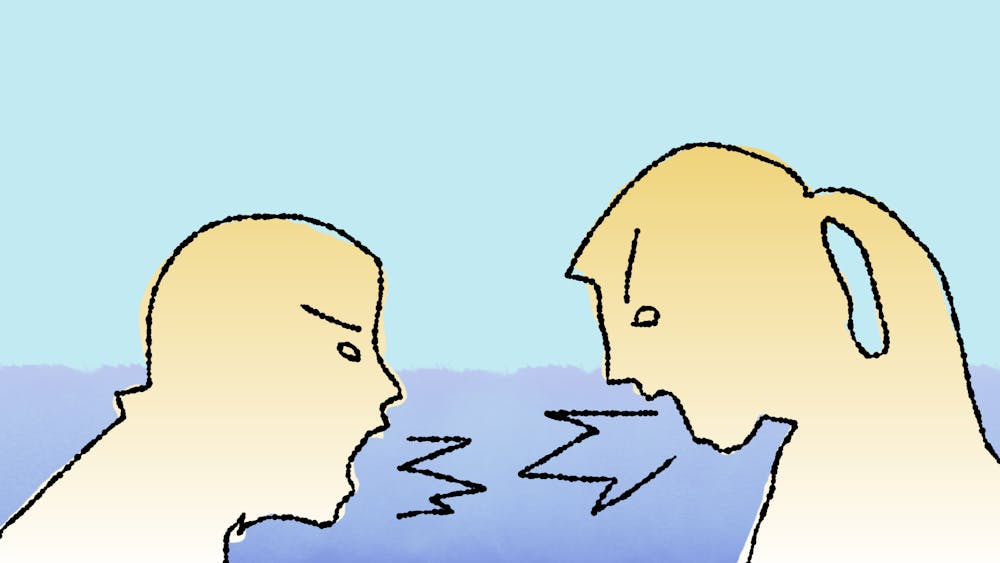We’ve seen it time and time again: female protagonists going head to head over a guy. It’s Blair against Serena, Meredith against Addison, Peyton against Brooke, and—a more recent favorite—Kate against Edwina in season two of Bridgerton. The love triangle is often used to create tension between two female characters in film and television. This trope has been present in popular culture and storytelling practices for a very long time, and it seems as though it isn’t going away any time soon.
The current season of The Bachelorette features two female leads for the first time in the franchise’s history—besides, of course, the time in 2015 when the producers made the men vote between two eligible Bachelorettes on night one. Rachel Recchia and Gabby Windey both made it into the final three on the last season of The Bachelor, starring Clayton Echard. Clayton left both Rachel and Gabby heartbroken, and the two women became close friends, bonding over their shared romantic trauma. Fans were excited that after a disastrous previous season, the two would both have the opportunity to find love as they costar in The Bachelorette. No one expected that the season would lack any semblance of structure, and that the bachelorettes would be dating the same pool of 32 men, therefore turning the show into more of a competition between the women than anyone hoped for.
The season was promoted as a spin on the more conventional structure of The Bachelorette that was supposed to remain empowering: two women, very deserving of finding love after devastation months prior, finding their soulmate side by side—but separately. Two distinct journeys to find love. So far, it’s been the opposite. The show’s format gives all the power back to the male contestants and pits Rachel and Gabby directly against each other.
Normal seasons of The Bachelorette include a group of 30–or–so men competing to win over one bachelorette. This season, because two women are dating the same 32 men, every party involved has a decision to make. As one might imagine, there’s some overlap in which men the women like, but ultimately, it seems that the choice doesn't really belong to the female leads. The men this season often reject one of the bachelorettes rudely for the other, creating tension between the women.
While it’s been said by the host that the producers didn’t have a plan for this season in terms of how the men would be divided up between the two women, longtime fans of the franchise can see right through the lie. The decision was likely very intentional—the producers saw a great opportunity for drama, which would in turn yield higher ratings and more viewers. The franchise’s numbers have been dropping dramatically over the past few seasons, and this new format begs the question of whether or not this one was a last–ditch effort to get ratings up.
The idea that women should compete with each other for male affection is always being pushed. But why do we buy into it, and what makes the trope so exciting to consume? Perhaps it’s the competition aspect that makes it compelling. Everyone wants to be chosen, and everyone wants to find love. Viewers are able to pick a side and root for a couple, making them feel as though they’re in on something. Siding with the winner can also make the viewer feel as though they themselves have won. Somehow, TV shows and movies often make this situation seem as though it would be enjoyable. The trope also appeals to male viewers, boosting their egos by making them believe it’s normal and fun for two women to be fighting for their attention.
Consuming these types of stories is just harmless fun though, right? Maybe not. From childhood, girls are subconsciously subjected to the idea that a woman’s purpose in life is to find a man, and that we should view each other as rivals. Think Gabriella, Sharpay, and Troy in High School Musical, Cinderella’s evil stepsisters in the Disney classic. While not all shows and movies perpetuate these potentially harmful narratives, many of them do, and as we can see from current popular entertainment like this season of The Bachelorette, it’s still a problem. Because of this, it’s important to be mindful and think critically about the media we consume—it can have real influences on the way we view ourselves and the world around us.







